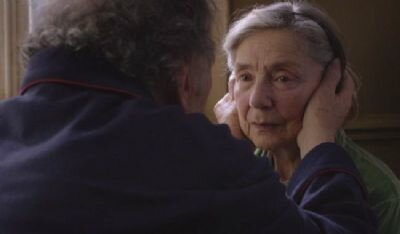|
|
| Tookey's Review |
|
| Pro Reviews |
|
| Mixed Reviews |
|
| Anti Reviews |
|
| Cast |
|
| |
 |
| |
| Released: |
2012 |
| |
|
| Genre: |
DRAMA
FOREIGN
ROMANCE
|
| |
|
| Origin: |
France |
| |
|
| Colour: |
C |
| |
|
| Length: |
127 |
|
| |
|
| |
|
|
| |
|
|
Grim tale of approaching death.
|
Reviewed by Chris Tookey
|
This year’s winner of the Cannes Film Festival Palme d’Or begins with neighbours breaking into a Paris apartment, where they discover the decomposing corpse of an old woman. Austrian writer-director Michael Haneke then shows us in gruelling detail her last few weeks, being cared for by her husband of many years.
Georges (Jean-Louis Trintignant, pictured left) and Anne (Emmanuelle Riva, right) are retired music teachers, still very much in love. A series of strokes suffered by Anne puts that to the test.
First, she’s confined to a wheelchair, and then to bed. Their grown-up daughter (Isabelle Huppert) wonders if Georges is competent to look after Anne, and professional carers are called in, with mixed results.
The unique strength of this film lies in its sympathetic but unsentimental view of old age.
For anyone who has witnessed the physical decline of their own parents, it’s upsetting, and for those who haven’t it offers a depressing view of horrors that old age and imminent death will bring to most of us.
Indignity, shame and humiliation are all shown unsparingly and at length – though the decline of Anne is blessedly quick, when as many of us know the process can last months and even years.
This is a brave attempt to tackle aspects of life that the cinema normally doesn’t touch. All the same, the issues that it raises are universal.
In a deliberately unfashionable style, Haneke goes for long, static takes that draw attention to the people, not the camerawork. As a result, some will find Amour claustrophobic and monotonous, but its sincerity and humanity held me gripped throughout.
It’s one of a kind, yet it reminded me a good deal of two other classics: the Japanese auteur Ozu’s masterpiece of family life, Tokyo Story, and Ingmar Bergman’s Cries and Whispers, a brilliant but relentless study of a woman dying of cancer.
How on earth does one give such a film a star-rating?
Its entertainment value for many will be nil. I admired it, but I couldn’t help wondering who would pay money to put themselves through such an ordeal.
I’ll give it near-top marks, along with a warning that you may well find it so depressing as to be intolerable. It’s certainly worth seeing if you’re strong enough.
It is superbly made and shows aspects of love that are too often ignored in the cinema: loyalty, compassion and commitment. This is film-making of the highest quality and seriousness. It is powerful and honest, beautifully crafted and exquisitely acted. Whether many people will wish to see it is another matter.
|
|
|
